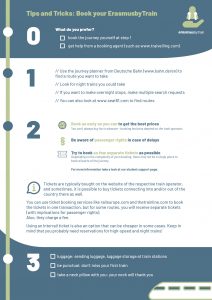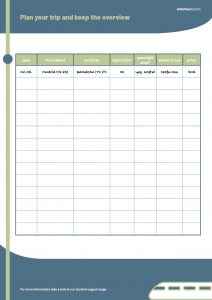Taking the train rather than the plane to go on your Erasmus might seem daunting at first, but rest assured that you not only cut back on your travel emissions, you also get to experience the diversity of countries and landscapes you travel through in the comfort of your train seat.
To make your booking process as easy, cheap and convenient as possible, you’ll find 3 easy steps to booking your rail journey below – including tips and tricks on how to book and go about your journey.
We are doing our best to keep this site up-to-date and accurate, but all information is without guarantee!
Financing your sustainable Erasmus+ journey
Your Erasmus+ costs money, and getting to your Erasmus+ destination can be a significant chunk of that. Since 2024, the Erasmus+ Grant finally includes a travel grant1 which is differentiated by distance to your Erasmus+ destination (as the crow flies; calculate your distance here) and whether you travel sustainably. Since you appear to be interested to go by train, you’re in luck: You get a significantly higher travel grant by travelling sustainably!
| Travel distance | Green travel | Non-Green travel | Difference Green/Non-Green |
|---|---|---|---|
| 10–99 km | 56 EUR | 28 EUR | +28 EUR |
| 100–499 km | 285 EUR | 211 EUR | +74 EUR |
| 500–1999 km | 417 EUR | 309 EUR | +108 EUR |
| 2000–2999 km | 535 EUR | 395 EUR | +140 EUR |
| 3000–3999 km | 785 EUR | 580 EUR | +205 EUR |
| 4000–7999 km | 1188 EUR | 1188 EUR | +0 EUR |
| ≥ 8000 km | 1735 EUR | 1735 EUR | +0 EUR |
Table: Travel support under the rules of the 2024 Erasmus+ Programme Guide
1 If you’re not from Czechia, Germany, Italy, or Wallonia (Belgium), that is. These countries/regions have unfortunately opted out of the travel grant. We know this sucks, and rest assured we’re doing all we can to change this
0. Booking the trip yourself or booking using an agent
Booking international train tickets can be complicated. Below, you’ll find lots of advice on how to book your journey, but if you can afford it, you can also book train tickets via an agent such as Traivelling. They will charge a fee for their work, but they will also take care of planning your route and booking your tickets. But again: booking the tickets yourself is very much possible – read on to find out how!
1. Finding connections to your destination

There is no perfect European rail journey planner yet. Usually, the international journey planner of Deutsche Bahn (the German state-owned railway) is very good at finding connections between any two cities in Europe – even if you don’t go via Germany. You can change the duration of transfer (i.e. the minimum amount of time between trains). If you decide to make an overnight stop in a city, it is best to try to look for two separate itineraries with two searches.
Night trains are a comfortable option for long distances. You can find an overview of night trains in Europe on this interactive map.

In mid-June and mid-December, timetables change in most countries, so don’t worry if the travel planner shows you no available connections after a timetable change – probably, the data is not ready yet. In the meantime, you can look for your connection before the timetable change and assume that the timetable will not change much (this is definitely good enough to get a rough idea of journey times).
Apart from journey planners, the website The Man in Seat 61 is a great resource on train travel in Europe: You can select the closest big city to your home and the website will provide you with detailed routes to many common destinations.
2. Booking tickets
When to buy tickets?
Generally, you don’t necessarily need to book regional train tickets in advance. There aren’t special discounts if you book in advance, so you can book the ticket at the time of departure.
With high-speed, long-distance trains (and sleeper trains), it’s different: they have adopted ticketing similar to airlines, offering tickets depending on time of departure and demand. In most cases, there is a standard price, which offers maximum flexibility while being very expensive. If you can commit to a specific itinerary, book as early as possible to get the best fares! You can expect to pay only ¼ of the regular price if you book very early.
But when is early? Well, that – unfortunately – depends! Generally, you can’t expect to be able to book more than six months in advance, but some trains are only bookable 60 days in advance. The Man in Seat 61 has an overview on when you can book which trains. If you book around the beginning of those time windows, you’ll be ahead of nearly everybody else and you’ll get the best fares!


Where to buy tickets?
If your journey is across several countries, you get to experience the diversity of different European landscapes and cultures on your journey. Before you can do that, however, you also get to experience the difficulties in booking tickets across borders. Unfortunately, there is no single place where you can buy tickets for any pan-European journey. If you book a single train that crosses a border, you can buy the ticket for the entire journey on the website of the train operator. If you have a connecting train in either country, try to book the ticket at the respective company. For example, if you want to go from Berlin (Germany) to Brussles (Belgium) via Cologne (Germany), you can buy a ticket for the whole journey at Deutsche Bahn. We have prepared an example journey which you can find in the PDF at the bottom of this page.
For anything more complex, you will need to split your booking to different tickets which you then buy at the respective website of the operator. You can also try this on journeys that can be booked as one ticket but are very expensive – with splitting tickets, you can sometimes save money.
Also look for your journey at The Man in Seat 61 for information on where to buy tickets for specific routes.
The Interrail Pass for Erasmus+
Interrail now offers a special pass tailored to the needs of Erasmus+ students—the Interrail Pass for Erasmus+! Specifically, the period of validity is six rather than two months, so you can use a single ticket for your out- and inbound journey if you’re only abroad for one semester. They offer two tickets which allow you to travel for four and six entire days within six months respectively.
Keep in mind that this may or may not be cheaper than buying regular tickets, especially if you just want to get to your destination straight away. For many trains, including most high-speed and all night trains, you need to buy an additional reservation, so the price of your journey may be more expensive than the ticket alone. Check out interrail.eu for prices.
This ticket is especially attractive if you want to make stops along the way and/or don’t want to commit to a specific itinerary way in advance. Make sure to check out other (regular) interrail passes too since they may be a better deal in your case.
Ticket booking services
There are services that combine multiple tickets and sell them in one go, most notably raileurope.com and thetrainline.com. At the end of the day, you will still receive multiple tickets, but the platforms allow you to book them in one go – while charging a small fee. This may or may not be worth it for you. However, both sites are not able to sell you tickets for all countries. Most notably, they lack most Scandinavian and Eastern European operators. If you plan to travel in those countries, you probably need to do multiple bookings yourself.

Delayed trains and your rights
Note: This is not legal advice! We have done our best at providing accurate information, but at the end of the day, you are responsible for making sure that you know your rights.
For journeys on one ticket, your passenger rights are protected by CIV: even if your ticket is valid for a specific connection only, you are eligible to take the next train if you miss a train due to delays. However, CIV only applies inside a transportation contract. This means that if you split your ticket, you are not legally protected under CIV should you encounter a delay “between tickets”. This is where the Agreement on Journey Continuation (AJC) comes in: under the condition that the affected train operators are signatories to the agreement (see here for a list and more information), the AJC allows you to take the next train – even if the delayed connection is “between tickets”!
To avoid missed trains and subsequent problems, plan with generous time buffers!
3. The journey
You’ve booked your tickets and the journey awaits! How can you get the most out of your train ride across Europe? We’ve collected some of our favourite tips to make the journey as pleasant as possible.

Luggage
Normally, there are no limitations on how much luggage you can bring on a train, as long as you can carry it yourself! Changing trains can be stressful with many different items though, so try to pack compactly.

Be punctual
You really don’t want to miss your train! If you miss your train and you have a ticket for a specific itinerary, you can’t just board a later train. However you get to the train station, plan with generous time buffers!

Use lockers at train stations
You want to make a stop in a city to explore it for a few hours, but you have all your luggage for your next semester with you? At big train stations, you can almost always find lockers where you can safely leave your luggage while you explore the city.

Look out of the window
Take in the scenery! By taking the train, you can get a glimpse of the diverse landscapes of different European countries out of the comfort of your seat.

Strike up a conversation with fellow travellers
Meeting new people has never been so easy.

Look out for your valuables
If possible, keep your luggage in sight, and keep your passport and other valuables close.
Take a neck pillow with you:
Your neck will thank you
Additional information
Print/fill out your personal PDF with:
// Tips and Tricks to book your Erasmus
// Personal booking planner
// An example route




If you have further questions regarding your sustainable
Erasmus journey, we are happy to try to help you!
Please note that we unfortunately cannot support you financially or give out tickets.
You can email us at studentsupport@erasmusbytrain.eu.
Our support speaks English and German.
Don’t be afraid to send us a request regardless of your proficiency in a language—we are all learning, and it shouldn’t be an obstacle to your sustainable Erasmus experience.
This post does not involve any paid partnership and we do not warrant the content of the linked sites.
